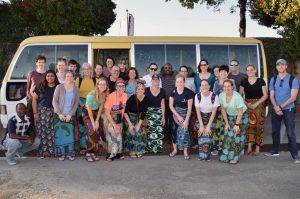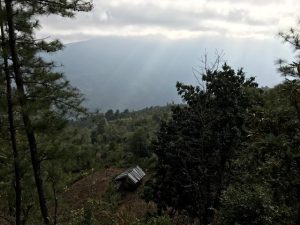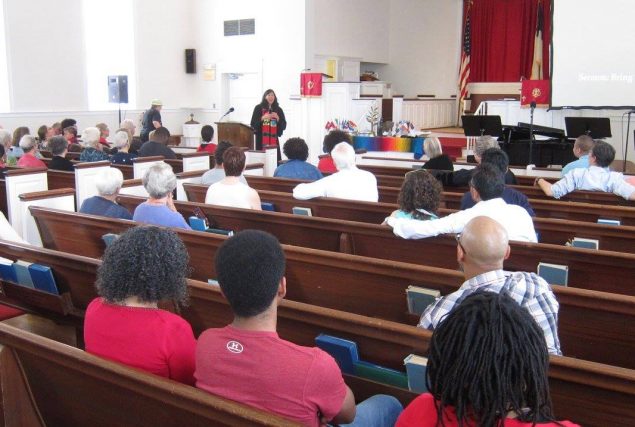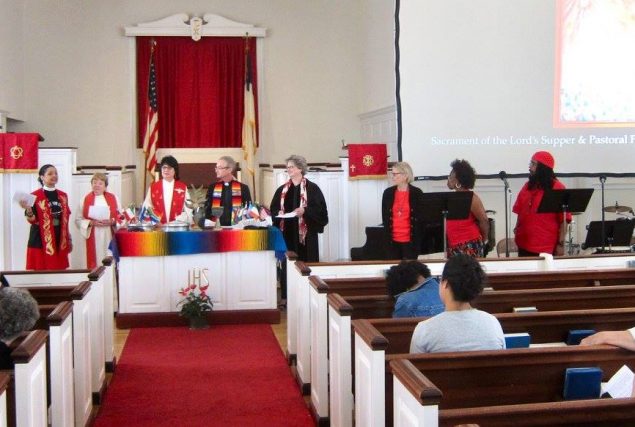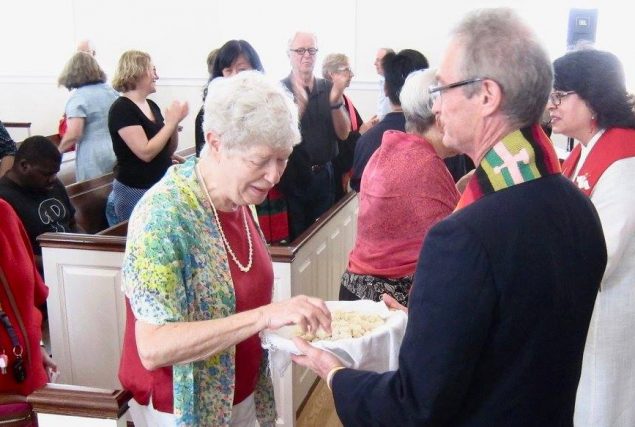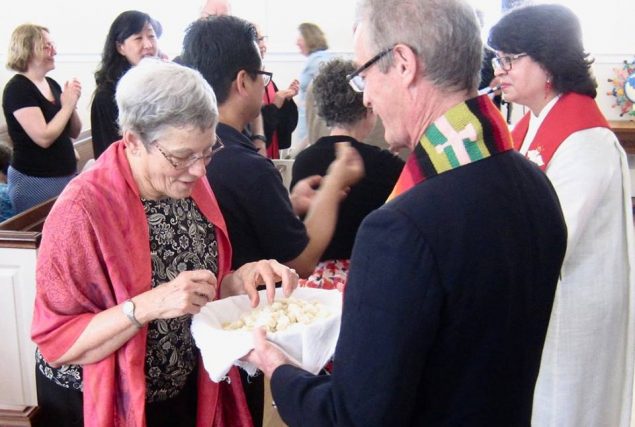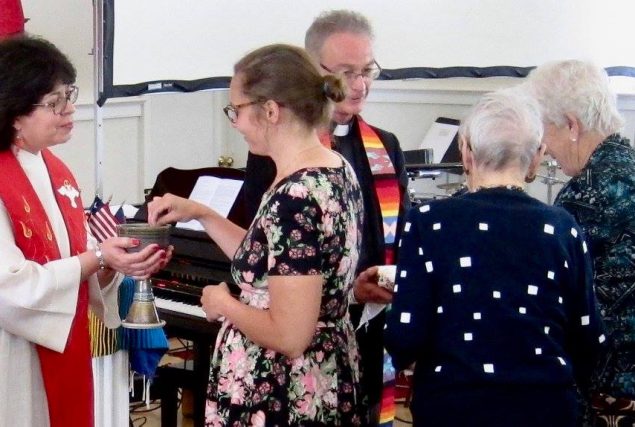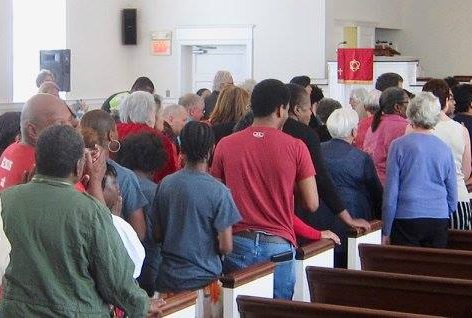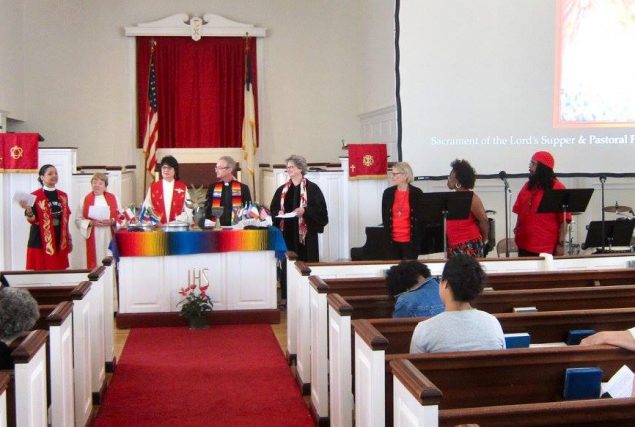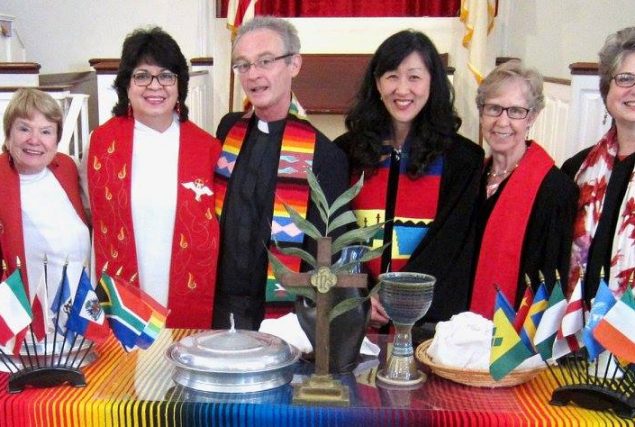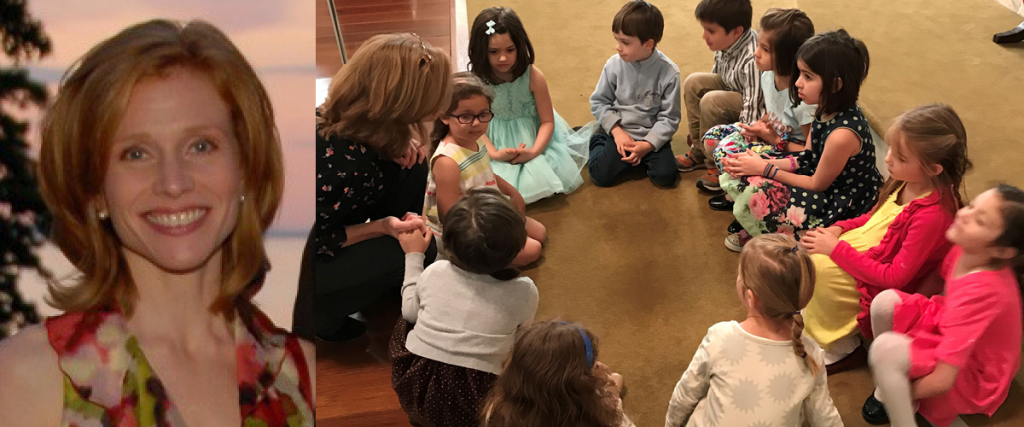Matthew 13:1-9, 18-23
Andrew Scales
July 16, 2017
When I was a sophomore in high school, I played exactly one season of football, and I was very bad at it. I was a few inches shorter than I am now, and about twenty-five pounds lighter, which meant that I was essentially thrown around like a rag doll on the practice field. Some of my teammates were two hundred and fifty, three hundred pounds, and I had basically no hand-eye coordination. It became evident to me and everyone on my team very quickly that this was a bad idea.
For weeks, I went to every practice and ended up becoming a tackling dummy for the guys on the defensive line. I suited up for every game, and spent the whole time on the sidelines. I never got better, I never really learned the plays, I kept showing up and failing hard.
Halfway through the season, we had our usual Friday night game, followed by a 7 a.m. Saturday morning practice. I wasn’t quite sixteen yet, and so my dad would drive me over to the field. But on that Saturday morning, I sat in my dad’s car and broke into tears. Why am I still doing this when I don’t get to play? Why train, and get hit all the time, and put my best effort into it, when I just end up on the sidelines? I told my dad I wasn’t going to practice that morning, I wouldn’t be going to practice anymore at all. I quit.
My dad sat there for awhile and listened to me sobbing in the car, and then he said, “Andrew, you may not realize it right now, but this is a very important moment in your life. You made a promise to your teammates and your coaches that you would be there, no matter what. You have to finish this season; you don’t have to touch a football ever again after that, but you need to finish what you start. I promise you, you’re not going to do it alone; I’ll be there with you.” So I nodded, and wiped the snot from my nose, and we drove to practice.
Late in October, I suited up yet again for a Friday night home game. The air was getting chilly, the bleachers were packed with parents and schoolmates in their scarves and coats. Sometime in the first quarter, it started to drizzle a little bit. By the second quarter, the rain came down hard in icy sheets. Everybody in the bleachers started the familiar exodus up the steps to the gym to wait out the storm while the game continued on the field.
I was on the sideline, freezing cold in the rain. But when I looked out in the stands behind me, there was one person left. My dad was sitting there, holding his umbrella, nodding at me. Coach didn’t end up putting me in that night; in fact, I hardly watched the game at all. I just stood there, back turned to the field, watching my dad, my dad watching me, nodding at each other, understanding each other.
I think my dad thought he was teaching me the value of hard work, that if you try hard and practice, you’ll be rewarded with becoming good at something. But I didn’t get good at football, I never played again after the awards ceremony that year. I learned something else though: even though I tried and failed miserably, it didn’t change my dad’s love for me.
Jesus tells a story in Matthew’s Gospel, too, about following him as disciple, encountering failure, and discovering that we are loved beyond our ability to understand.
Jesus’ parable of the sower is frustratingly frank: failure is an inescapable part of the Christian life. His call to discipleship is not easy; it can be frustratingly hard. Sometimes bearing witness to the Kingdom of God takes root and flourishes; sometimes it doesn’t. But God is faithful still. That, Jesus explains, is how proclaiming the Kingdom of Heaven works.
Let’s step back and get our bearings for a moment. Matthew writes that great crowds have followed Jesus throughout Galilee to hear him preach about the Kingdom of Heaven. It was so suffocating in the house where Jesus was staying that he heads out to the shoreline to teach in the open air. The beach gets too crowded, so Jesus climbs into a boat and his disciples push him a little ways off the shore. Everyone is waiting, watching, listening. This is Jesus’ moment to make his mark as a teacher, a Jewish rabbi who talks about the reign of God breaking into their lives.
Jesus begins with a story from their everyday experience: a sower scatters seed around in her field. The sowing does not go well: the more time passes, the more problems arise. Some of the seeds land on the footpath, and the birds get to them and gobble them up. A few seeds have a promising start and shoot up quickly, but the soil turns out to be shallow. The plants look good at first, but their roots cannot deepen to draw enough water. The little plants burn up under the pitiless sun before they can put forth a flower.
A few days pass, the growing season continues, and even more promising plants start to lose out to competing thorn-bushes. The sower either doesn’t have the time to dig out those nasty weeds, or she knows that doing so will uproot and kill both the good and the bad plants. So those plants don’t make it either; they end up stunted in the shadow of plants that are useless. So far, not so good. The count at this point is failure, failure, failure.
Can you imagine the sower going out into her field every morning at dawn, checking to see if her crop is still there? That bag of seed she scattered was probably all she had from last season’s harvest. There isn’t a Lowe’s she can go to and buy new seedlings if all the ones she started with die off, like Len and I have been doing with our herb garden this summer. This is the only option—this has to work; a harvest must come, or she won’t have crops to sell. She might not have enough to eat or plant next year. There’s more riding on these plants’ survival than we hobby gardeners realize. This is a matter of feast or famine, life or death.
But in some places, the soil is good, the seeds take root, and they grow up in spite of all the threats we can imagine. Some plants flourish and bring forth an abundant harvest. The sower will be able to eat, to sell in the market, to set some seeds aside for sowing in the new planting season.
As the sower puts her grain in the storehouse, the rhythms begin all over again with the same challenges as before. Failure, failure, failure, and yet… wildly abundant harvest beyond imagining. That’s the end of Jesus’ story. That’s what God’s Kingdom is like.
The folks who gathered on the beach to hear Jesus are scratching their heads; the disciples take Jesus aside and say they could use a little more explanation: “Come on, Jesus! Make it plain!” But Jesus has made it plain: love other people, knowing that we will fail, and trusting that God will make that love grow, even if it comes to fruition beyond our ability to see.
Sometimes the more we try to love people, the harder it can be to do so. For the past few weeks, Len and I have been meeting with about ten to twelve of the graduate students and young adults involved with Princeton Presbyterians for a summer book club here at Nassau Presbyterian Church. We’ve been reading Sara Miles’ book Take This Bread, which is about Miles’ experience of conversion to Christianity. Sara, who grew up without a religious tradition, has a powerful spiritual experience sharing the Eucharist during worship as a visitor at St. Gregory’s Episcopal Church. But more than that, the book chronicles her continuing evolution as a believer as she founds a food pantry out of that parish in the Mission District of San Francisco.
Before she converted to Christianity, Sara lived as a journalist in Central America through civil wars in El Salvador and Central America during the eighties. She worked as a cook in various kitchens in New York City. She lived much of her life mostly unaware of what church was or why it mattered to people. And yet, somehow, in her forties, the experience of sharing in the bread and wine at Jesus’ Table, surrounded by fellow human beings who are both sinners and unfathomably loved by God, was this transformative moment that changed the course of her life forever. She discovers in taking that bread and cup that she was hungering, longing for something that she could not name, and she is stunned to find what she longed for was Jesus Christ.
Communion, the Lord’s Table where all are fed, inspires Sara to start a food pantry at her church. Much of the book focuses on Sara’s work running that pantry, attempting to serve anyone who comes without barriers to entry. And one of the things that impresses me so much about her writing is that she does not hide how frustrating it can be to love and serve other human beings.
There are times when she is startlingly honest about her failure to love folks who come to the pantry. Life at the pantry is messy, and she has bad, rotten days like everyone else because she’s in a bad mood, or because she’s fed up with the stresses of keeping a small non-profit afloat. Sometimes the supply of food runs short, and they have to turn hungry people away. Sometimes her own pride gets in the way of listening to people who disagree with her about how the pantry should be run. Sometimes she lets her work get in the way of life with her daughter, Katie, and her wife, Martha. There are failures and shortcomings and frustrations that bubble up in almost every chapter.
The book Take This Bread talks so much about failure, but at the same time it’s about the beautiful way God nourishes people through the Lord’s Supper. Communion happens at St. Gregory’s Episcopal Church not just during Sunday services, but on the Friday afternoons when people line up to take home bags of rice, an armload of vegetables, a loaf of bread. God takes up ordinary human things like bread and wine, a food pantry, a gathering of neighbors who otherwise don’t know one another, and transforms them into a sign of the feast of the Kingdom of God. It’s a story about failure, failure, failure, and yet… wildly abundant harvest beyond imagining.
Jesus’ parable of the sower, and Sara Miles’ book Take This Bread made me realize this week how much of the Gospel is about God’s faithfulness and steadfast love beyond our ability to respond successfully. The disciples are the “good fruit” in this story, the ones who supposedly hear the word and understand. But as the story of Matthew’s Gospel goes on, the disciples try their best to follow Jesus, and fail spectacularly. The disciples! The people who knew Jesus best, and followed him everywhere from Galilee to Jerusalem, and preached alongside him, and healed crowds of sick persons with him, and fed five thousand with him. The disciples go all the way to the hill of the cross with Jesus, and abandon him when he needed them most. What hope can we have if we know the story of even the best disciples ends in failure?
I think the parable makes sense when we pause to remember that it’s Jesus telling us the story. The biblical scholar Ulrich Luz writes in his Matthew commentary that this parable can only be understood in light of the risen Jesus’ last words to his disciples in Matthew’s Gospel. Jesus says to them, “Remember, I am with you always, even to the end of the age.” Jesus promises to be faithful in love, never to forsake us, even when we fail and fall short as his disciples. Jesus, who was rejected in his hometown, deserted by his friends, crucified alone in shame, stands risen from the dead in front of those same friends in Galilee, speaking a promise of steadfast love despite their shortcomings.
Yes, God has a way of doing something with works of love that turns the world inside out. Yes, friends, I’ll say it again another way: amid the struggles and failures and catastrophes of our lives, God brings the Kingdom into this world through God’s own steadfast love. The risen Jesus calls us to be faithful in loving our neighbors regardless of whether it looks like a success or not. And some of us may be a part of something that bears abundant fruit; some of us may struggle in serving others with little to show for it.
And the more we try to love people, as Sara Miles tried with all her heart to love people at her food pantry, the more we become aware of how we fail at trying to do so. The risen Jesus loves us just the same. Jesus calls again and again, “Follow me!” without condemnation. The flourishing is up to the living God, the God who raised Jesus from the dead.
The freedom of a Christian lies in this: we persevere and fail, and yet there is a faithful God who welcomes us, even us, into the Kingdom life of joy, love, and peace. Anyone with ears, let them hear. Amen.
© 2017 Nassau Presbyterian Church
Contact the church to obtain reprint permission.

